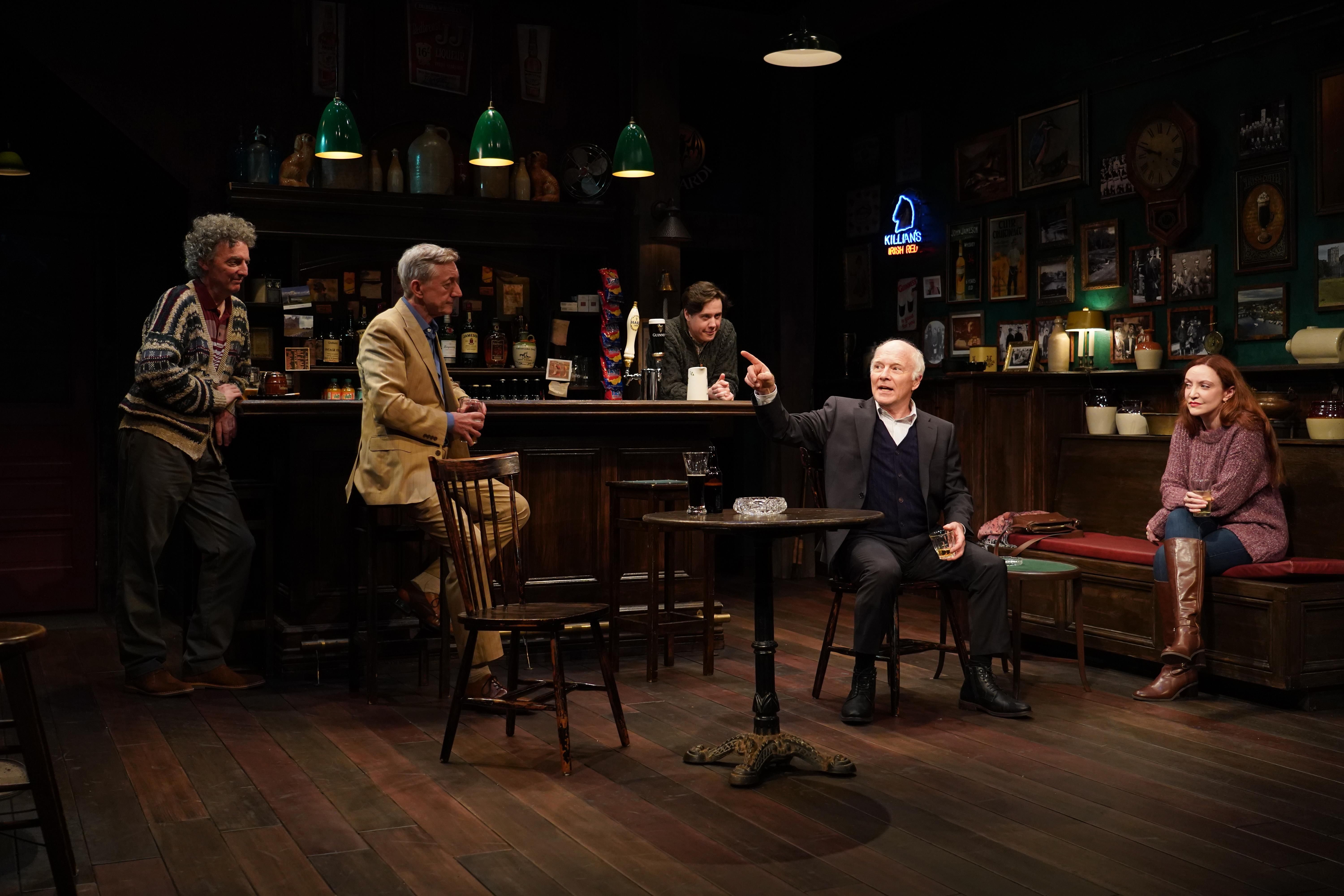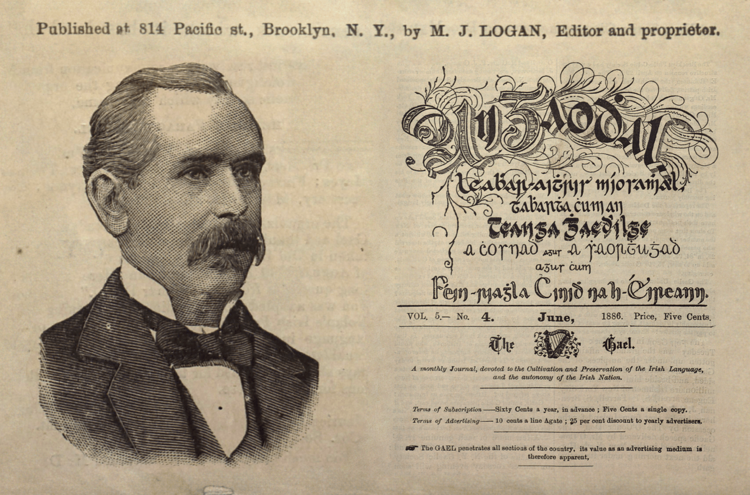There are spirits in the spirits of the Irish Repertory Theatre’s current revival of “The Weir,” where strangers gather in search of friendships, uninvited fears, and the phantoms of familiarity, abandoned by time down the road long ago.
An ever-prescient reminder to the present, and of the presence of life itself, this cautionary tale to the lonely returns, in-person to the Francis J. Greenburger stage, a word of sympathy from the little corners of oblivion. Under Ciarán O’Reilly’s heart-rendered direction, this production of “The Weir” gives name to the empty space in our lives, a destination for those chasing ghosts, and an old voice of hope in a grave place, through Aug. 31.
The acclaimed Conor McPherson drama finds audiences for a time overhearing sparse words from a handful of lives near the Leitrim town of Carrick-on- Shannon, in an area isolated, desolate, and functionally forgotten to contemporary times. Set in a less-than-bustling local bar —a pub unknown to Yelp or QR codes—owned by Brendan (Johnny Hopkins), a young hometown hanger-on of the family land, whose dwindling day is spent nominally serving (and often self-served) the few friendless men that frequent there.
At the arrival of mechanic and amateur raconteur Jack (Dan Butler), followed later by neighbour Jim (John Keating), a routine resumes in which this trio proceeds to bicker, banter, and barter the roll call of drinks and smokes, all for the Hecuba of conjecture, to stave away the looming silence. The usual dig is spat, the odd gossip offered up, and between the pointless punctuation of breathing, the unerring assurance that tomorrow will remain unchanged.
The routine gets upended, however, when fellow barfly Finbar (Sean Gormley), a local-man-made-good entrepreneur with “an eye for the gap,” leases the home of the late Moira Nealon to a young and pretty divorcee “down from Dublin,” Valerie (Sarah Street), who has moved to the countryside for some sought after repose and peace.
Flirting with the potential small town scandal, the married Finbar brings Valerie around to the pub for an introduction. After a well-intended welcome and, unsure of how to appropriately entertain their supposedly sophisticated guest from the big city—let alone an attractive single woman—the talk of the provincial gents inevitably turns to a self-parodying trope of rural life: telling local folktales of faeries, ghosts, and graveyards. Yet as Jack, Finbar, and Jim spin enough yarn to stock the cardigan shelf of a Leitrim tourist shop, Valerie admits to the skeleton kept in her own closet, and gives up the ghost with a mournful story that haunts her.
On the current stage at Irish Rep, this "pint of life" classic by McPherson provides some lightweight social remark, while not being so rough around the edges as to incur the censorship of our far-right autocrat detractors and financiers. The play’s subtle commentary on certain hostilities in rural disparity and urban elitism are mildly alluded to, and congenially resolved; hardly obvious enough in O’Reilly’s production to find offense, yet notably relevant for an American audience potently embroiled in regional factionalism. Colbert should be reasonably safe to audition for its next premiere at the Rep.
Yet more pertinent altogether to O’Reilly’s ever-compassionate direction are the themes that prevail and exude through his many marvelous productions and performers: empathy for the outsider, the dispersion of prejudice, and kindness for the fugitive seeking solace. Irrespective of origin, each of these characters are their own exiles, and this cast acknowledges them as such. In this effortless 90-minute act, they may lightly berate each other, but deeply bereave with one another.
In an ordinary expectation, Irish Rep polishes off this production with yet another ensemble of excellence, and fills to the brim with noteworthy performances. In his role as Jim, John Keating—who never seems to falter on the Irish Rep’s stage in portraying some invariable iteration of an earnest codger, helplessly endears himself to audiences yet again, whose plosive knack for humour must be his formative instinct. Like a Kramer-on-Carrick, Keating ambushes the crowd with his candid antics, and his calculated simpleton jibes elicit loudest reactions.
Perhaps more so is the understated lead of Dan Butler’s performance, who in the role of Jack gives a quiet command of many scenes with his charming, natural ordinariness. Butler regales in McPherson’s language with ease; so impeccably and innately spoken at times, that, had one not known Butler better, one might suspect that he was truly enjoying a drop from the draught and spilling Jack’s story from out of his soul.
In his part as Finbar, Sean Gormley proves commendable in a performance far more intricate and complicated than suspected. As the resented hometown hero-sellout, Gormley is the ideal foil to Butler’s Jack and Keating’s Jim, whose often contradicting pride and modesty embodies himself as the production’s social feud, while his inherent dignity toward his friends and Valerie alike equally softens his callous ambitions.
With a sometimes out of place performance, Johnny Hopkins makes a good and thrifty role, if not occasionally aloof, of Brendan, presenting his audience with a rather heady and peculiar role of a young man who stands intentionally in his place, yet ambivalent about the worth of it. In his scenes, Hopkins refrains from being entirely present, as if resigning himself to a future among the dead, that is so vaguely perceptive to those who cop on to it, that the reveal of it becomes heartbreaking.
Of all that this ensemble achieves together, Sarah Street once more exceeds from the margins with a pure emanation, and an honest humanity that is undeniably real. Like her exemplary performance as the Mouth in “Not I” for Irish Rep’s previously staged “Beckett Briefs,” Street’s portrayal of Valerie is one unconcealed by artifice, disarmed from fate, and liberated of pretense. Neither a victim of circumstance nor a tragic hero, Street delivers her part, whose sole hope is to move on and find quietness, with true admiration.
“The Weir,” for its own worth, has not ceased to be morally grounding. We may think we’ve changed, but the story remains the same: wherever you go, the ghosts will be there. The grass is never greener; the simple life never so simple. To every choice, a regret. In the silence of our minds, a memory sings under the door, the past comes tapping at the window. We cannot run from them, or drown our ghosts into a dream.
They live in us. We live by them.
For tickets, visit irishrep.org








